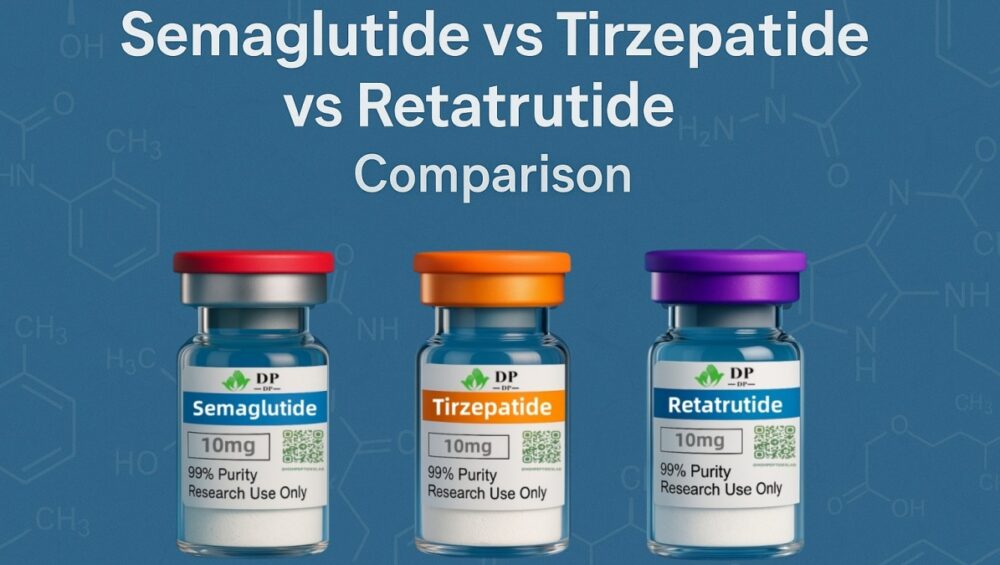Semaglutide vs Tirzepatide vs Retatrutide - ¿Cuál es la diferencia?
En los debates de investigación, Semaglutide es un agonista del receptor GLP-1, Tirzepatide es un agonista dual GIP/GLP-1, y Retatrutide se describe a menudo como triple agonist (GLP-1/GIP/Glucagón). A continuación encontrará una comparación práctica y didáctica.
Instantánea del mecanismo
- Semaglutide (GLP-1): la señalización del apetito/saciedad y el contexto del control glucémico.
- Tirzepatide (GIP/GLP-1): añade la incretina GIP a la GLP-1 para obtener un perfil de incretina más amplio.
- Retatrutide (GLP-1/GIP/Glucagon): introduce un tercer eje (glucagón) relacionado con las discusiones sobre el gasto energético.
Principales beneficios analizados (contexto de la investigación)
- Modelos de control de peso: marcos de control del apetito y equilibrio energético.
- Contexto de apoyo glucémico: charla de alto nivel en torno a las vías de manipulación de la glucosa.
- Conductores de elección: amplitud de la vía única frente a la doble frente a la triple; objetivos, disponibilidad y coste.
Manipulación y almacenamiento básicos
- Forma: normalmente blanco lyophilized powder por vial.
- Conservar cerrado a 2-8 °C: proteger de la luz/humedad; seguir los PNT locales del laboratorio.
- Reconstitución: utilizar un diluyente adecuado, agitar suavemente a lo largo de la pared vial.
- Después de la reconstitución: refrigerar y utilizar rápidamente según el procedimiento.
Posibles consideraciones secundarias (resumen)
- Las molestias gastrointestinales (náuseas/malestar) se observan en las discusiones de las fuentes con el trabajo de la vía de la incretina.
- Evitar el apilamiento no supervisado; los protocolos del eje endocrino pueden ser sensibles.
Descargo de responsabilidad: Visión general informativa; no es un consejo médico.
Precio y consejos de compra (perspectiva directa de fábrica)
- Kit matemáticas: confirmar vials por kit y mg por vial; comparar precio unitario por vial/kit.
- Logística: pida plazos de entrega, embalaje/cadena de frío y asistencia posventa.
- Directo de fábrica: menos capas intermedias, comunicación más clara.
Comparación rápida (de un vistazo)
- Semaglutide: Enfoque GLP-1; ampliamente discutido para el apetito/saciedad.
- Tirzepatide: Incretina dual GIP/GLP-1; a menudo comparada en precio/disponibilidad frente a semaglutida.
- Retatrutide: Enfoque triple GLP-1/GIP/Glucagón; los lectores sopesan la amplitud frente al coste/soporte.
Productos relacionados
Sólo contenido educativo. Este artículo está destinado a la lectura general y no proporciona asesoramiento médico.

